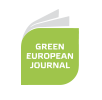Back in 2009 resource security was still a niche confined to a handful of experts. Since then, it has dramatically entered the mainstream. Policymakers all over the world have finally understood the relevance of raw materials as an essential pillar of any comprehensive industrial policy. Hitherto little known minerals, such as the rare earth elements, have received ample coverage by the media. Having turned into a topic of regular political small talk, no self-respecting consultancy or think tank can today afford to ignore this issue.
In this context, a panoply of national resource strategies is emerging. The EU Member States, Germany, Finland, and the Netherlands have already put theirs on the table. Japan published its strategy last year, backing it with a $1 billion dollar strong budget. The US Congress is currently considering four legislative proposals, while the European Commission communicated its raw materials policy last February and the European Parliament is also entering the fray with its current deliberations on a report on raw materials.
While national policies have continuously progressed in the field of raw materials, the G-20 has so far failed to prominently address the issue. This in spite of the fact that a large business coalition, spearheaded by the US Chamber of Commerce, attempted to force the topic on the agenda of the Seoul Summit in 2010. Now, Paris with its current G-20 Presidency hopes to put the matter up for debate again. This time with a special focus on agricultural commodities and commodity speculation.
All of these resource policies and discussions share one distinguishing commonality. They showcase that the debate by and large oscillates between two aspects: foreign supply-side measures focusing on access to resources and demand-side measures such as resource efficiency and recycling. Access to raw materials, particularly access to reasonably priced raw materials, has by far received the majority of industry’s and policymakers’ attention. This comes as no surprise. After all, it is the decreasing access to raw materials due in part to increasing export quotas and taxes that sparked the whole debate. Demand-side measures such as resource efficiency or cradle-to-cradle recycling have received less attention in this context. One particular example is the European Commission’s EU-2020 Strategy where the European Parliament had to fight hard with the Commission only to get an explicit mentioning of resource efficiency. Prioritizing access to raw materials, however, does not come without some of its own historical baggage. Many development NGOs, for example, see such a prioritization as sowing the seeds for a new wave of neo-colonialism.
It is in this context that the framing of the international discourse on raw materials becomes crucial. An excessive and self-serving focus on accessing foreign supplies will do little more than promote an antagonistic Manichean scramble for resources. Pushing resource efficiency into the centre of the debate, on the other hand, would reduce the likelihood of such a scenario while simultaneously contributing to our transformation to a low-carbon, efficient and competitive economy. Increasing industrial efficiencies, after all, will play an increasingly important role in ensuring resource security.
Take the case of rare earths for example. By now everybody knows that 97 per cent of these indispensable minerals, vital for the high-tech and green industry, are produced in China. This wasn’t always the case. Beijing systematically built up its current monopoly over the span of the last 20 years, while we in the West were naively pleased with this development importing these resources on the cheap and leaving the Chinese to deal with the associated environmental problems. Never mind the fact that rare earths are not rare with deposits existing in a wide range of countries such as the United States, Canada, India, Vietnam, Kazakhstan, Greenland and even Sweden. Intent on no longer being the West’s resource appendage, however, China is increasingly requiring the lion’s share of its domestic production as it builds up its own value chain. Hence, the increasing export quotas and tariffs. In addition, Beijing is using this leverage also as a tool of power-projection as it did when it blocked exports to Japan.
But even if there was unrestricted access to Chinese rare earths, this would only be of a temporary benefit. The drastic development of green technologies is increasing global demand. While in 2010, demand equalled around 120’000 tonnes per annum, current projections predict a demand of almost double in the coming years, with production hardly keeping apace. Within the next decade, even China is expected to become a net importer of rare earths. It is in this context that, besides diversifying sources, efficiency strategies that reduce our demand will be of utmost importance. Practical strategies for the recycling of rare earths, for example, will have to be implemented as proposed by the Berlin-based Öko-Institute in a study commissioned by the Greens in the European Parliament.
The West will also have to rethink its approach to accessing raw materials more generally. If it wants to ensure an adequate and reliable supply from foreign sources, it will have to offer mutually-beneficial partnerships to resource-rich countries, which respect these countries resource sovereignty. China-bashing won’t bring any tangible results. And while the WTO dispute settlement mechanism provides one specific recourse to action, it is unable to solve the increasing international competition over resources as a whole. China is not the only competitor after all. India is also quietly following in China’s footsteps as are Brazil and Argentina.
Regrettably, this situation of an increasing competition over resources is also inadequately addressed internationally. There is a real lacuna with regards to global governance on raw materials, in spite of the fact that this is desperately needed. An international platform where grievances can be voiced, mutual understanding increased and ideally some rules within this increasing competition over resources set, would help contain a worsening scramble for resources. Several fora already exist, such as the OECD, the International Metal Study Groups, or the Intergovernmental Forum on Mining, Minerals, Metals and Sustainable Development (MMMSD). But none of them include all the necessary players from the industrial, emerging and developing countries. Something more akin to the International Energy Forum (IEF), which includes energy ministers from 86 countries, is needed for metals and other important minerals. In this context, the G20, under the leadership of the French Presidency, should press for either the establishment of a new international forum on raw materials or it could upgrade the existing MMMSD to include at least more EU Member States, the United States, China and Australia. As an interim step, the European Commission should already support widening the scope of the International Metals Study Group (currently focusing on copper, lead, zinc and nickel) to include other metals such as iron and other high-technology metals as well as increasing their membership. Track II diplomacy should also be reinforced by supporting the exchange of academia, non-governmental organisations and think tanks between resource-relevant industrial, emerging and developing countries.
All of these measures should be in the interest of everybody. After all, no country is completely autarkic in today’s interdependent world and industrial, emerging and developing countries have a shared interest in inter alia improving statistics on supply and demand – as indeed the IEF is doing with its Joint Oil Data Initiative (JODI) – good governance and transparency in commodity markets. To paraphrase Winston Churchill: a forum for dialogue is needed for the countries to jaw jaw rather than war war over raw materials.
The times that the economic heavyweight of the West could guarantee open doors to resources is over. With globalisation a new wave of industrial countries is emerging. If we continue our current use of raw materials and do not engage in an open and mutually-beneficial dialogue, a scramble for resources will be inevitable. This is particularly the case as our global environment will not be able to cope with the new industrial countries producing as resource-intensely as we currently do. We need an international forum to bridge differences while simultaneously dashing forward ourselves, focusing on an increase in our own industrial efficiencies. Only by using our resources more wisely and engaging in a constructive dialogue will we be able to meet today’s resource challenges head-on.
Reinhard Bütikofer is Vice-President and Spokesperson on industrial affairs for the Greens/EFA Group as well as the Rapporteur on Raw Materials, in the European Parliament. He sits, amongst others on its Committee on Industry, Research and Energy (ITRE), the Subcommittee on Security and Defence (SEDE) and the Delegation for relations with the United States.
Der Artikel erschien zuerst im monatlichen Newsletter des BEPA (Bureau of European Policy Advisors) der Europäischen Kommission.
Foto: Dried Clay Texture von Mr. Cody, lizensiert unter Attribution-ShareAlike 2.0 Generic

















